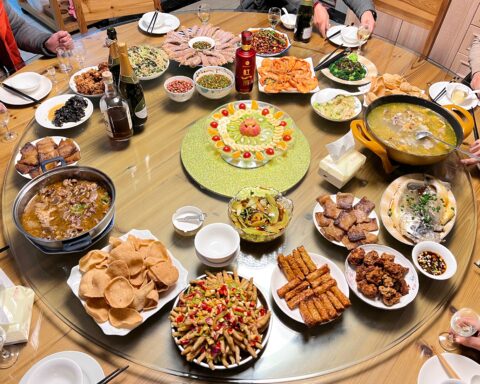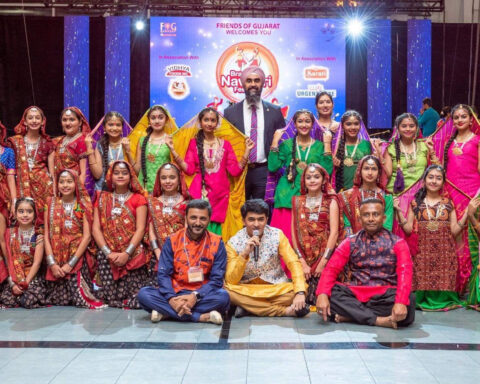Autumn is arguably the most beautiful season in Toronto, but even clear skies and above-average temperatures weren’t enough to keep Samantha Beniprashad-Maharaj and her husband Ryan Maharaj from leaving the country to get married this past October.
Before he had even proposed in June 2015, Ryan, 33, and Samantha, 30, had decided they wanted to have a destination wedding. Samantha says they wanted to cut on costs and, more importantly, “eliminate stress and chaos.” A year-and-a-half of planning later, they flew to Jamaica and were married at an all-inclusive resort in Montego Bay.
As a Guyanese-Canadian couple, Samantha, a human resources representative, and Ryan, a loss prevention investigator, are just one of many young couples from Canada’s ethnic communities opting for a destination wedding instead of a local one.
Getting married abroad has become an attractive option for those who’d rather turn their special day into a vacation while getting more for their money. Unlike their parents’ generation, these couples care less about guest count and more about turning their special day into a big getaway. Vacation resorts now make it easier and more cost-effective than ever for couples to have a destination wedding, pleasing young and old alike by accommodating cultural wedding traditions abroad. Tara Soloway, co-founder of Toronto-based agency Luxe Destination Weddings, says the number of requests for cultural marriage ceremonies abroad have increased over the past two years.
Of all the weddings her agency now manages, Soloway says, 25 to 30 per cent require traditional cultural elements and she predicts that number will keep growing. “[Couples are] looking to have fun rather than a stressful traditional-type wedding.”
Samantha and Ryan were both aware of how demanding a traditional Guyanese wedding could be. Five years ago, Samantha’s older sister had both her Hindu and Christian ceremonies in Toronto with 300 and 500 guests at each, respectively. The total cost of her wedding was around $80,000.
In comparison, Samantha and Ryan’s wedding in mid-October cost $25,000, nearly $6,000 less than the national average, according to this bridal industry survey. That number includes the couple’s travel expenses, their seven-day stay in Jamaica, off-site excursions, both Hindu and Christian ceremonies, wedding regalia, decorations and pre-marriage festivities held in Toronto.
While most brides demand they be able to inspect their wedding venues firsthand before the big day, Samantha didn’t mind waiting until landing in Jamaica to see her resort in person. She had already scoped out all the details of her wedding online from the comfort of her home: pictures and videos of the cocktail party and wedding cake, for example, were just a click away.
It was the flight that Samantha felt the most apprehensive about. She worried that some of the suitcases might go missing — the one with the decorations, maybe, or the dresses. With 65 of her guests and their baggage on board, the plane was bound to get hectic.
“That was the highest point of anxiety for me but once we got there and we got settled everything was very, very smooth,” she says.
The flight ended up being hitch-free and cost-free as well: Samantha and Ryan had scored a deal where every seventh guest’s stay at the resort was on the house, so the couple’s flight and stay were free.
Amanda Punit, who is Guyanese-Canadian, was symbolically wed to her husband of Trinidadian descent, Thabo Kathirgamanathan, on a weeklong trip to Punta Cana in August 2015. The couple held their traditional Guyanese and Sri Lankan ceremonies at home in Toronto prior to the vacation but Amanda, 29, says she also wanted to plan something “smaller and more intimate.”
The couple’s Punta Cana wedding cost around $27,000 and was held at a venue off their all-inclusive resort. Unlike Samantha, Amanda was nervous about not seeing the locale before the reception. “You don’t know what to expect, you haven’t met anyone in person, you just see pictures and you hope that it all turns out the way it looks,” she says. But thanks to a group booking discount Amanda also scored significant savings: nearly all of her 95 guests booked through the same travel agency, Red Tag, and she was able to bring the cost of each all-inclusive stay down to $1360 from around $1700.
Resorts and airlines often offer discounts like this to lure in couples and the high volume of guests they bring. Vacation countries are also seeing a boost in their economy: local vendors that cater to the wedding industry are benefiting from this increase in travel weddings. Destinations like Jamaica do well because of relaxed residency requirements, even having a page on their consulate website promoting the ease of hotel marriages.
“A lot of these countries want people to come down and get married because it’s great for tourism,” says Soloway.
Kara Mahbubani and her husband Arun opened their restaurant Mystic India six years ago in Ironshore, a suburb along the coast just east of Montego Bay. The couple caters authentic Indian cuisine to weddings on and off nearby resorts, also providing Hindu weddings with traditional props like Dandia sticks, used for Gujarati dances, and the Havan Kund, a fire pit.
According to Kara, Mystic India has seen a “significant increase in sales.”
“Destination weddings have become such a trend since the past three or four years,” she says. Her restaurant now caters two to four weddings a month, up from one wedding every three to four months in 2012.
Food and garments aside, there was one aspect of Samantha and Ryan’s wedding that didn’t stick to conventional Hindu wedding guidelines: the guest count. Of the 250 people that were invited, 72 adults and eight children celebrated with them in Montego Bay, a tiny number compared to most Hindu weddings where guest counts can surge into the hundreds.
The reason: guests must pay sizeably larger bills for destination weddings than they would a local one.
While there are no Canadian estimates, this 2015 American Express report says that guests in the U.S. spent an average of U.S. $673 (or Cdn $821 in 2015) per wedding; Samantha and Ryan’s attendees paid $1,534 (Cdn) per person for the seven-day trip.
That price can put a heavy cap on the number of guests able to afford a destination wedding, which can be problematic since some ethnic communities prefer more guests than less. On top of long travel times and big bills for guests, it’s just another reason for families to advise against destination weddings.
Soloway says she’s witnessed pushback from parents who had envisioned a more traditional marriage for their kids. “We see it all the time…sometimes it’s more of a personal struggle that a mother or father can face,” she says. Samantha’s mother Rawattie Beniprashad had some reservations. “In Guyana destination weddings are very uncommon and would be considered a luxurious and different way to get married,” she says. However, the fact that Samantha’s out-of-town wedding actually cut on costs was a big plus, and Beniprashad says that for many guests it was more than a wedding, it was a family holiday.
Since marriages in Guyana are usually home affairs, Samantha honoured the Hindu maticore and mehendi traditions at her parent’s place in Toronto before flying to Jamaica. During these ceremonies, the bride is dyed and purified at home and the women dance outside to the lively beat of traditional tassa drums, an essential component of Guyanese weddings. But Samantha didn’t get to have the tassa drums, having opted for a simplified version because Toronto’s weather was “on and off”.
Beniprashad was worried that the rest of her daughter’s wedding in Montego Bay would mean more cuts to those wedding traditions. “One of the major concerns I had was that if the resort would be able to deliver on all of the Hindu customs that we wanted to include in her ceremony.”
It’s a common worry, and many wedding agencies catering to ethnic communities use parents’ peace-of-mind as a selling point for their businesses. Blue Petal Destination Weddings is a Vancouver-based agency that specializes in Hindi, Sikh and Muslim destination weddings in Mexico, and their website lists ‘keeping your family happy’ as the first major feature of their service.
Pam Gosal, president of Blue Petal Destination Weddings, says that parents should express explicitly to planners what they expect, especially in a country where English isn’t the first language. “Communication is a very important aspect of this,” she says. “You don’t want your wires crossed.”
Soloway says that many large destination resorts have had to evolve over the last two years to become more accessible to couples of different ethnic backgrounds and their families. Some resorts keep a roster of cultural wedding-friendly vendors while others offer to help couples find local officiants like rabbis or pandits for their ceremonies, Many now have chefs onsite that can accommodate more traditional and demanding feasts. Kosher meals, for example, are now available at select resorts that previously didn’t offer them before due to the tremendous effort it takes to transform a Caribbean kitchen into a kosher one.
“It’s great because that allows for more people to attend the wedding, especially the older family members who are a bit more skeptical,” says Soloway. “It’s been happening slowly over time but now everybody’s kind of catching up … and even moving into the future we’re going to be seeing more and more of it.”
According to Samantha, their Hindu ceremony in Jamaica had all the accoutrements of an authentic Guyanese wedding. The ceremony included a pandit that the couple flew out from Toronto, fresh-water coconuts for guests and a buffet of South Asian fare, all-included. “The resort did an amazing job at helping us keep with the traditions,” she says.
As for Samantha’s mother, her worries were appeased, saying that her daughter’s wedding was “everything we imagined it to be.” Destination weddings can be a meeting of cultures — that of the newlyweds’ and of the country they’re visiting. While the destination may seem unfamiliar, the fusion of customs is something members of ethnic communities are familiar with living in a country as diverse as Canada.
“The location and simplicity of my daughter’s wedding was definitely different … [but] the core traditions and rituals have not changed,” says Beniprashad. “To us Canadians, it’s a lot of fun.”
Tanya is a content creator and journalist reporting on diasporic culture and communities in Toronto.




